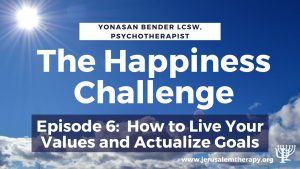Years back my wife got a great gig at Mishpacha Magazine heading their digital advertising. It was technical work demanding high creativity. She was perfect. We had in mind that in any new job, you should expect emotional kickback. Even something like a promotion predicts depression. Sure, it’s amazing and the pay is phenomenal but you lose a lot. You leave behind your network of friends, maybe some resent you for your success (or their failures), your familiar surroundings vanish, and when you pack up to move into the new high-rise office you break your favorite mug. Everything has a price… even success.
The emotional kickback for my wife was far darker. She was exposed, nonstop, to the newsreel – terrorist attacks, murders, hiking fatalities, all nonstop. Countering this, she subscribed to a positive-new-only newsletter. Surprisingly, we learned mainstream media was painting a grossly disproportionate picture of the world. It turns out on every measure of human suffering things are not only dramatically improving – they’re improving at exponential rates. Tracking over 200 years there’s a continually speeding decrease in murder, crime, violence, war, disease, and famine. We’re even less likely to get hit by lightning!
One statistic caught my eye, though. In the US, anxiety and depression amongst teens is slightly increasing over recent decades. While there’s a lot of factors, social psychologists have found one is the 24/7 newsfeeds and its effects on how parents treat their kids. Like my wife starting at Mishpacha, parents are hit with the message, “Watch out! The world is dangerous!” passing this on in how they talk, create rules, and behave with their kids. It’s a tough problem to compensate for since you also need to know what’s going on in the world. Two strategies are worth trying out. First, staying informed is your best defense like my wife did. Living in Israel we can all relate to the experience of rolling our eyes at our chutznik relatives with what they see in the news. “No, we don’t live in a war zone, bubby. You should come visit.” Second, no question you have to keep you kids safe and must learn to effectively do that, but count and see how many times you warn them something is, “very dangerous.” Ask yourself, if the frequency of this message make them safer or more anxious.
——————-
Rabbi Yonasan Bender LCSW graduated from Hebrew University’s School of Social Work. He works with adults, couples, and children from his private therapy practice in Jerusalem. He holds several semichos from Rav Yitzchok Berkovits, shlita. To share your thoughts, experiences, questions, or a different perspective, you can reach Rabbi Yonasan Bender LCSW at 053-808-0435 and at info@jerusalemtherapy.org or check out his website at www.jerusalemtherapy.org.




